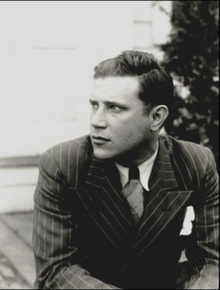Jesse Stuart
| Jesse Stuart | |
|---|---|
 |
|
| Born | Jesse Hilton Stuart August 8, 1907 Riverton, Kentucky, United States |
| Died | February 17, 1984 (aged 77) Ironton, Ohio, US |
| Occupation | Author, educator |
| Alma mater | Lincoln Memorial University Vanderbilt University |
| Notable works | Taps for Private Tussie |
| Notable awards | Guggenheim Award, 1937 Thomas Jefferson Memorial Award, 1943 Poet Laureate of Kentucky, 1954 |
| Spouse | Naomi Deane Norris |
| Relatives | Mitchell Stuart (father) Martha Stuart (mother) |
| Website | |
| www |
|
Jesse Hilton Stuart (August 8, 1906 – February 17, 1984) was an American writer, school teacher, and school administrator who is known for his short stories, poetry, and novels as well as non-fiction autobiographical works set in central Appalachia. Born and raised in Greenup County, Kentucky, Stuart relied heavily on the rural locale of northeastern Kentucky for his writings. Stuart was named the poet laureate of Kentucky in 1954.
Stuart was born near Riverton, Greenup County, Kentucky, to Mitchell and Martha (Hilton) Stuart on August 8, 1907. Stuart served in the US Navy during World War II but did not see combat as his mission in his life. In 1939, Stuart married Naomi Deane Norris, a school teacher. They settled in W Hollow and had one daughter, Jessica Jane.
After being denied admission at three colleges, Stuart was finally accepted at and attended Lincoln Memorial University, near Harrogate, Tennessee. After graduating he returned to his home area and taught at Warnock High School in Greenup, Kentucky. Later he was appointed principal at McKell High School, but resigned after one year to attend graduate school at Vanderbilt University. He then served as superintendent of the Greenup County Schools before ending his career as an English teacher at Portsmouth High School in Portsmouth, Ohio.
One day while Stuart was plowing in the field, he stopped and wrote the first line of a sonnet: "I am a farmer singing at the plow," the first line of the 703 sonnets he would collect in Man with a Bull-Tongue Plow (1934). The book was described by Irish poet George William Russell (who wrote poetry under the name of AE) as the greatest work of poetry to come out of America since Walt Whitman published Leaves of Grass. Stuart was named poet laureate for the Commonwelath of Kentucky in 1954, and in 1961 he received the annual award from the American Academy of Poets.
Stuart's first novel was Trees of Heaven (1940). Set in rural Kentucky, the novel tells the story of Anse Bushman, who loves working the land and wants more land. Stuart's style is simple and sparse. Taps for Private Tussie (1943) is perhaps his most popular novel, selling more than a million copies in only two years. The novel also received critical praise and won the Thomas Jefferson Memorial Award for the best Southern book of the year. In 1974, Gale Research (in American Fiction, 1900-1950) identified Jesse Stuart as one of the forty-four novelists in the first half of the 20th century with high critical acclaim. Jesse Stuart was the second youngest of that group (William Saroyan was one year younger).
...
Wikipedia
